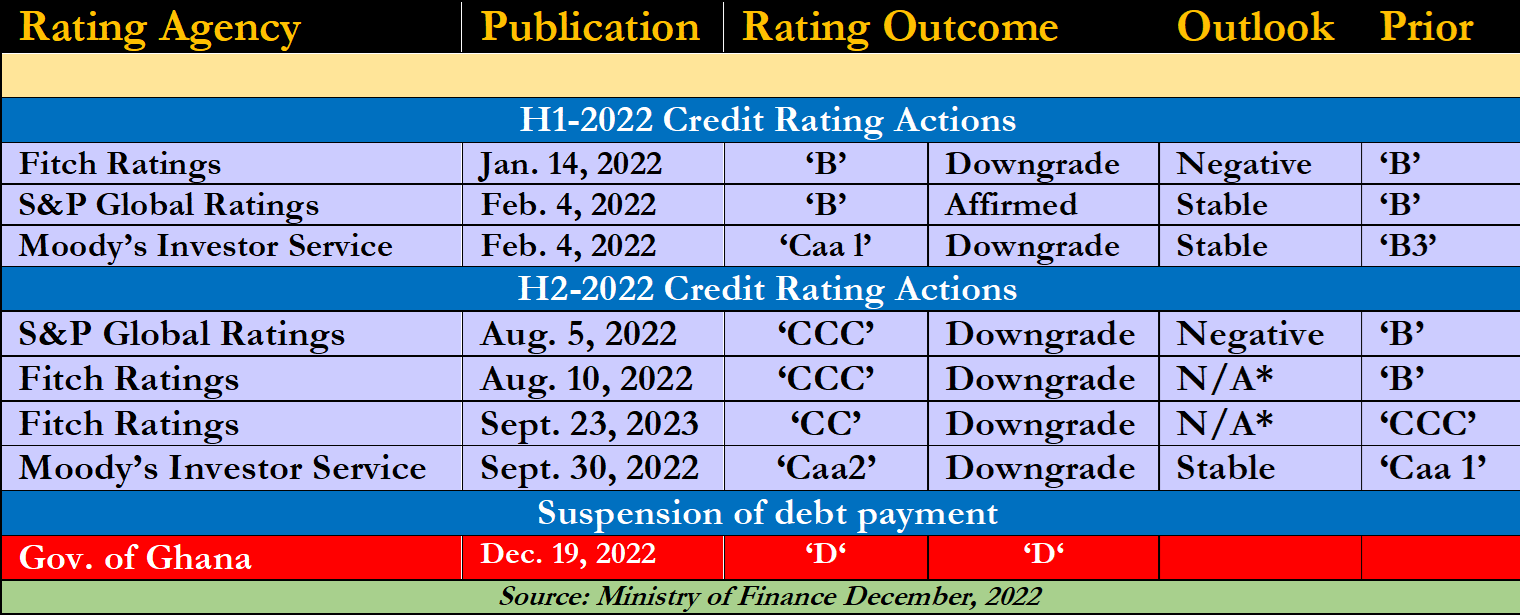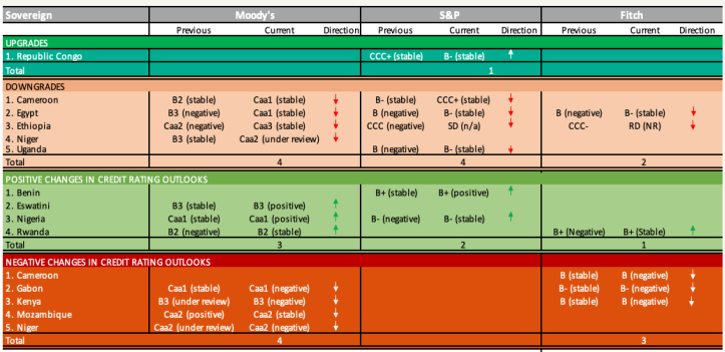Ghana's sovereign credit rating roller coaster
Musa Kanyirigi, London, UK
April 06, 2024
R ating agencies are maintaining a default grade on Ghana’s debt. This contrasts sharply with the three years preceding the COVID-19 pandemic. During that period Ghana was able to hold on to a ‟speculative” but not default credit rating, despite international turbulence. The three largest international rating agencies (CRAs), Standards & Poor’s (S&P), Moody’s and Fitch, allocated ‟B” rating for Ghana between 2017 and 2020. Even though the country was showing signs of economic distress, the CRAs stressed Ghana’s capacity to repay its debts, but also highlighted the country's vulnerability to the deterioration of the domestic and global economic conditions.
Credit rating is an important part of modern finance. Policy makers use credit worthiness to guide and evaluate policy making. Investors also use rating to model the risks of and funding requirements for project finance. Nations use rating to send positive signals to lenders and reduce borrowing cost.
‟Debt Pandemic”
According to researchers from the World Bank, the Covid-19 pandemic triggered an international ‟debt pandemic‟, illustrated by prominent cases of default in Sub Saharan Africa. World Bank researchers noticed that the COVID-19 pandemic lengthened the list of developing and emerging market economies in debt distress1. Ethiopia, Zambia, Zimbabwe and Ghana were the largest defaulters on a variety of debt instruments. Tanzania, Sudan, Mozambique and Mali also defaulted.
Between January 2020 and March 2021, the three major CRAs issued 99 sovereign rating downgrades in 48 countries, affecting 35 percent of their rated sovereign portfolio2. Fitch recorded 14 separate default events during the same period, across nine different sovereigns. It also saw 19 defaults across 13 different countries between 2000 and 20193. In Africa, 38 African countries have seen a sharp rise in central government debt between 2009 and 2018. During the same period, 24 African countries surpassed 55 percent debt-to-GDP. For these countries, debt servicing absorbed a high proportion of government revenues.
Ghana
Ghana’s credit worthiness deteriorated during the third quarter of 2022. On August 5th, 2022, Standard and Poor’s (S&P) Global Ratings downgraded Ghana’s credit ratings from ‟B-/B” to ‟CCC+/C” over missed payments. According to S&P, the downgrade was due to intensifying financing and external pressures on the economy4.
During the same period, Fitch, and Moody’s produced similar arguments to maintain Ghana in the lowest rating categories, citing ‟a deteriorating fiscal” situation of the country. But Ghanaian authorities expressed reservation about the downgrade arguing that the decisions omitted of critical data and did not consider efforts and sacrifices to redress the economy5. On December 19 2022, Ghana crashed.
Suspension
On December 19th, 2022, the Government of Ghana announced a ‟suspension of payments on selected external debts of the Government of Ghana” for certain categories of external debt, pending a consensual restructuring of these obligations6.
In the statement announcing the suspension, the government explained that, in 2020 and 2021, the COVID-19 pandemic had a negative impact on the country’s fiscal situation. Global risk aversion, Ken Ofori-Atta, Minister of Finance said, triggered large capital outflows, a loss of external market access and rising domestic borrowing costs. TThe Minister also also explained that the Russian invasion of Ukraine had ‟ further adversely affected the country's economy just when it was beginning to recover from the pandemic”.
The announcement triggered a downgrade crescendo. Fitch, S&P and Moody, which had warned of a high risk of default, eventually said Ghana was not capable of servicing the debt. On February 21st, 2023, following the expiration of the grace period for a missed Eurobond coupon payment, Fitch downgraded Ghana to Issuer Default Rating (IDR) or ‟RD”. Before Fitch, S&P and Moody’s had relegated Ghana sovereign instruments to default status. Instantly, but in a uncoordinated move, banks, bilateral and multilateral financial institutions froze Ghana out of the international financial markets.
Ghana evolving credit rating

Transition
The downgrades exacerbated Ghana internal economic problems. But the Bank of Ghana (BoG) responded by tightening the monetary policy to curb inflation. It also introduced measures to eliminate the monetary financing of the budget. Together with the government, the BoG launched initiatives to reverse capital outflow, for example through the ‟Gold for Oil” program. This program helped Ghana to purchase refined hydrocarbon without spending foreign currency reserves while simultaneously tackling the depreciation of the Cedi against the US dollar. The BoG also increase the country gold reserves to boost reserves and stabilize the national currency.
Since the downgrades, the government has implemented a domestic debt exchange program, which restructured domestic-currency and domestic-dollar-denominated bonds. In another step, the International Monetary Fund (IMF) approved a US$3 billion Extended Credit Facility (ECF) arrangement for Ghana on May 17th, 2023. The ECF contains a package of reforms aimed at building resilience and laying the foundation for strong and inclusive growth. In January 2024, Ghana agreed to the restructuring of US$5.4 billion of debt with bilateral lenders, including China and France. Ghana reached a similar agreement for the restrucuring of US413 million Eurobond debt in July 2024.
Outlook
International rating agencies are beginning to heed Ghana's recovery efforts. For example, in a recent report, dated July 2023, Fitch forecast that IMF disbursements will stabilize Ghana’s foreign reserves. The rating agency argued that strong gold exports and lower external interest payment outflows will attenuate the volatility of the exchange rate. However, it cautioned that subsequent performance of the Cedi will hinge on negotiations between Ghana and its external creditors7. Fitch maintains Ghana’s default status.
The credit environment continues to deteriotate. According the The United Economic Commission (ECA) for Africa the outlook is negative for the Sub Sahara Africa region. Research from the ECA shows that out of the 23 sovereign rating actions by the three international CRAs during the second hals of 2023 period, 17 countries recorded a negative (downgrades and negative change in outlooks)8. The ECA explains that challenging domestic (political risks, cashflow issues, fiscal deficits and currency depreciation) and external market financing conditions are the main causes of the credit crunch. More importantly, the ECA blames the continued perception of risk of defaulting on outstanding bond obligations, even after restructuting.
In the short term, uncertainties surrounding the Russia-Ukraine war, the volatility of oil prices and the strength of the US Dollar are likely to continue to slow Ghana’s recovery. In the long term, downgrades are not automatically reversed when a country exits recession and enters recovery, according to the Brookings Institute9. In fact, according to the African Union10, empirical evidence has shown that it takes an average of seven years to regain a previous sovereign rating score after downgrade. However, favorable external conditions, combined with reforms, increase the probability of a speedy recovery.
Rating: Sub-Sarahan Africa (H2, 2023)

Source: United Nations Economic Commission for Africa (ECA), 2023
Related Articles
BIBLIOGRAPHY
1❩ Jeremy Bulow, Carmen Reinhart, Kenneth Rogoff, and Christoph Trebesch (2020): The debt pandemic - New steps are needed to improve sovereign debt workouts
2❩ Yen Tran et al. (2021): Sovereign credit ratings during the COVID-19 pandemic, International Review of Financial Analysis Volume 78, November 2021, 101879
3❩ Fitch (2023): Sovereign Defaults Are at Record High - https://www.fitchratings.com/research/sovereigns/sovereign-defaults-are-at-record-high-29-03-2023
4❩ https://mofep.gov.gh/news-and-events/2022-08-08/press-release-on-s-p-global-rating-actions-2022
5❩ https://mofep.gov.gh/press-release/2022-02-07/moodys-downgrades-ghana-rating-to-caa1-and-stabilizes-the-outlook
6❩ Ghana Ministry of Finance (Dec. 2022): Suspension of Payments on Selected External Debts of The GoG - https://mofep.gov.gh/press-release/2022-12-19/suspension-of-payments-on-selected-external-debts-of-the-government-of-ghana
7❩ Fitch–BMI (July 2023): Sub-Saharan Africa Monthly Outlook
8❩ ECA (2023): Africa Credit Sovereign rationg review (2023 Year End Outlook). - https://repository.uneca.org/bitstream/handle/10855/50025/b12041166.pdf?sequence=1&isAllowed=y
9❩ Hippolyte Fofack (2021): The ruinous price for Africa of pernicious ‟perception premiums” - https://www.brookings.edu/wp-content/uploads/2021/10/21.10.07_Perception-premiums.pdf
10❩ AU (2019). ‟APRM Support to Member States in the Field of rating Agencies (AMSRA): Concept Note.‟ African Union (AU), https://au.int/sites/default/files/newsevents/workingdocuments/35970- wd-12_aprm_concept_note_on_international_credit_rating_agencies_eng.pdf
